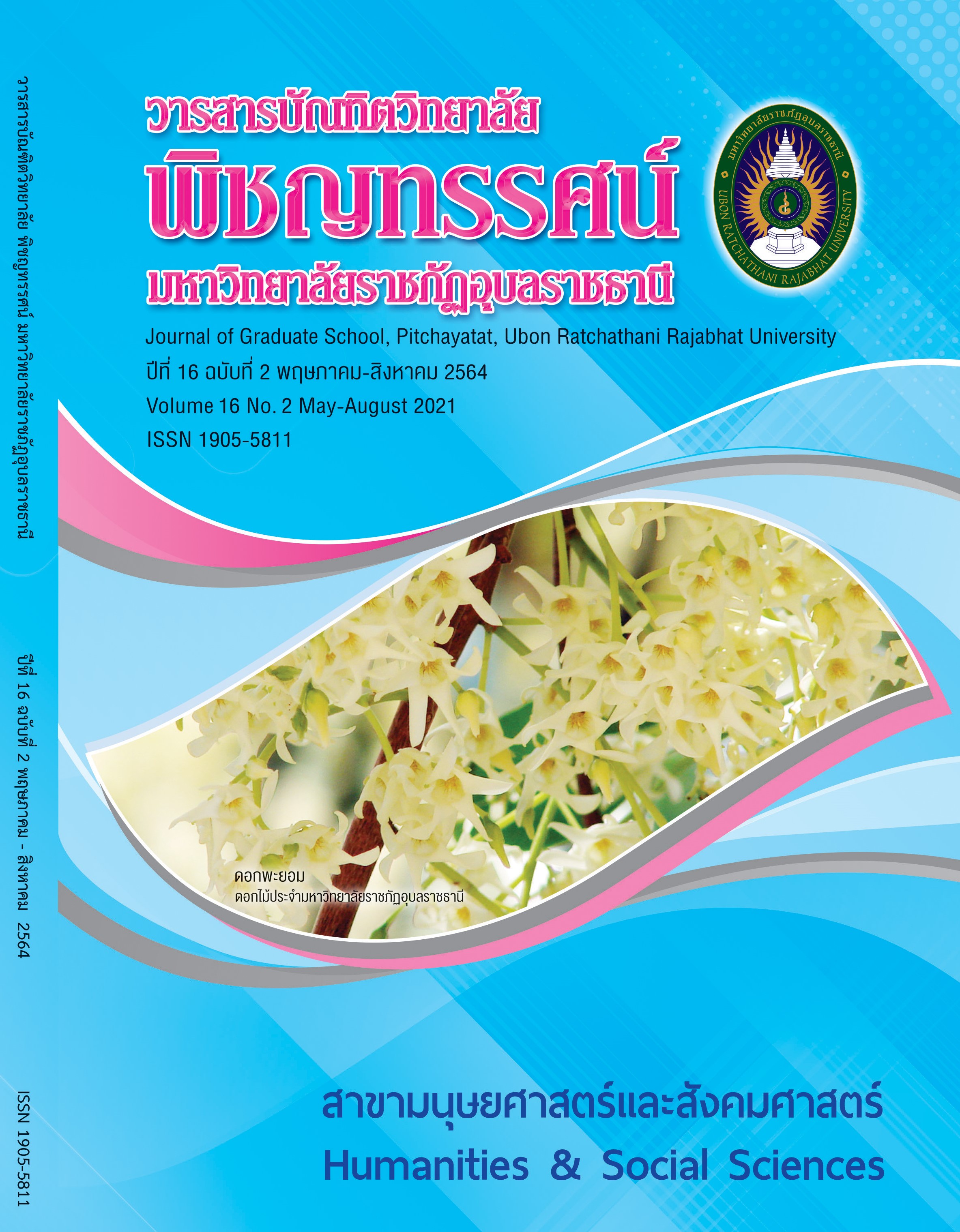ทักษะของผู้บริหารสถานศึกษายุคดิจ ทักษะของผู้บริหารสถานศึกษายุคดิจิทัล สังกัดสำนักงานเขตพื้นที่การศึกษาประถมศึกษา ศรีสะเกษ เขต 3
คำสำคัญ:
ทักษะของผู้บริหารยุคดิจิทัล, ผู้บริหารสถานศึกษายุคดิจิทัลบทคัดย่อ
การวิจัยนี้มีวัตถุประสงค์เพื่อ 1) ศึกษาทักษะของผู้บริหารสถานศึกษายุคดิจิทัล 2) เปรียบเทียบทักษะของผู้บริหารสถานศึกษายุคดิจิทัล จำแนกตาม สถานภาพการดำรงตำแหน่ง ประสบการณ์ในการปฏิบัติงาน และวุฒิการศึกษา 3) ศึกษาปัญหาและแนวทางการพัฒนาทักษะของผู้บริหารสถานศึกษายุคดิจิทัล สังกัดสำนักงานเขตพื้นที่การศึกษาประถมศึกษาศรีสะเกษ เขต 3 ตัวอย่างที่ใช้ประกอบด้วย ผู้บริหารสถานศึกษา และครู สังกัดสำนักงานเขตพื้นที่การศึกษาประถมศึกษาศรีสะเกษ เขต 3 จำนวน 339 คน โดยแบ่งเป็น ผู้บริหารสถานศึกษาจำนวน 22 คน ได้มาโดยวิธีการสุ่มแบบแบ่งชั้นภูมิตามสัดส่วน และครูจำนวน 317 คน ได้มาโดยวิธีการสุ่มแบบแบ่งชั้นภูมิตามสัดส่วน เครื่องมือที่ใช้ในการวิจัยคือ แบบสอบถาม จำนวน 339 ฉบับ สถิติที่ใช้ในการวิเคราะห์ข้อมูลคือ ร้อยละ ค่าเฉลี่ย ส่วนเบี่ยงเบนมาตรฐาน การทดสอบที และการทดสอบเอฟ
ผลการวิจัยพบว่า
- ทักษะของผู้บริหารสถานศึกษายุคดิจิทัล สังกัดสำนักงานเขตพื้นที่การศึกษาประถมศึกษา ศรีสะเกษ เขต 3 โดยรวมและรายด้านอยู่ในระดับมาก
- ผลการเปรียบเทียบทักษะของผู้บริหารสถานศึกษายุคดิจิทัล สังกัดสำนักงานเขตพื้นที่การศึกษาประถมศึกษาศรีสะเกษ เขต 3 จำแนกตาม สถานภาพการดำรงตำแหน่ง และประสบการณ์ในการปฏิบัติงาน พบว่าโดยรวม ไม่แตกต่างกัน และวุฒิการศึกษา พบว่า โดยรวมแตกต่างกันอย่างมีนัยสำคัญทางสถิติที่ระดับ 0.05
- ปัญหาและแนวทางพัฒนาทักษะของผู้บริหารสถานศึกษายุคดิจิทัล สังกัดสำนักงานเขตพื้นที่การศึกษาประถมศึกษาศรีสะเกษ เขต 3 1) ด้านการรู้เท่าทันและใช้เทคโนโลยีเป็น 2) ด้านความเข้าใจนโยบาย กฎหมายและมาตรฐาน 3) ด้านการใช้ดิจิทัลเพื่อการประยุกต์และพัฒนา 4) ด้านการใช้ดิจิทัลเพื่อการวางแผนบริหารจัดการและนำองค์กร 5) ด้านการใช้ดิจิทัลเพื่อขับเคลื่อนการเปลี่ยนแปลงและสร้างสรรค์ ทั้ง 5 ด้านพบว่า บุคลากรขาดความรู้ ความสามารถในการใช้ดิจิทัล ส่วนแนวทางการพัฒนานั้น ผู้บริหารต้องเป็นผู้นำในการนำดิจิทัลมาใช้ในการทำงาน เพื่อให้สถานศึกษาพัฒนาตามยุคดิจิทัล
เอกสารอ้างอิง
กัลยา ติงศภัทิย์. “ความท้าทาย ณ ขอบแดนใหม่แห่งการเรียนรู้: การศึกษาระบบ 4.0”. การประชุมวิชาการขอบแดนใหม่แห่งการเรียนรู้: การศึกษาระบบ 4.0 (New Frontier of Learning: Education 4.0); 1 พฤศจิกายน 2557; ศูนย์นวัตกรรมการเรียนรู้ จุฬาลงกรณ์มหาวิทยาลัยกรุงเทพฯ. โรงแรมดุสิตธานี กรุงเทพมหานคร, 2557. หน้า 2-4.
เขตพื้นที่การศึกษาประถมศึกษาศรีสะเกษเขต 3, สำนักงาน. แผนปฏิบัติการประจำปีงบประมาณ พ.ศ. 2562. ศรีสะเกษ: สำนักงานฯ, 2562.
คมคาย น้อยสิทธิ์. “ผู้บริหารยุคการศึกษา 4.0”. จุฬาลงกรณ์มหาวิทยาลัย. 46, 4 (ตุลาคม-ธันวาคม 2561): 40-57.
ปนัดดา พลแสน, ธีระภาพ เพชรมาลัยกุล และอภิธีร์ ทรงบัณฑิตย์. “บทบาทส่งเสริมการจัดการเรียนรู้และภาวะผู้นำการเปลี่ยนแปลงของผู้บริหารสถานศึกษาที่ส่งผลต่อทักษะการจัดการเรียนรู้ของครูในศตวรรษที่ 21 สังกัดสำนักงานเขตพื้นที่การศึกษา ประถมศึกษานนทบุรี เขต 1” มหาวิทยาลัยศรีนครินทรวิโรฒ. 15, 28 (มกราคม - มิถุนายน 2561): 172-183.
ปลัดกระทรวงศึกษาธิการ, สำนักงาน. แผนพัฒนาทักษะด้านดิจิทัลของข้าราชการครูและบุคลากร พ.ศ. 2562 – 2565. กรุงเทพฯ: สำนักงานฯ, 2562.
เพ็ญจันทร์ สินธุเขต. “การศึกษายุคนี้ (ยุคดิจิทัล) : Thailand 4.0,” การประชุมวิชาการระดับชาติ ครุศาสตร์วิจัย 2560/NACE2017: นวัตกรรมแห่งการเรียนรู้ ครั้งที่ 3; ลำปาง: คณะครุศาสตร์, มหาวิทยาลัยราชภัฏลำปาง 2560. หน้า 9.
มณฑาทิพย์ นามนุ. ทักษะของผู้บริหารสถานศึกษาในศตวรรษที่ 21 สังกัดสำนักงานเขตพื้นที่การศึกษาประถมศึกษาปทุมธานี เขต 2. วิทยานิพนธ์ศึกษาศาสตรมหาบัณฑิต สาขาวิชาการบริหารการศึกษา มหาวิทยาลัยเทคโนโลยีราชมงคลธัญบุรี, 2561.
ยืน ภู่วรวรรณ. “ความท้าทาย ณ ขอบแดนใหม่แห่งการเรียนรู้: การศึกษาระบบ 4.0 (Challenges of New Frontier in Learning : Education 4.0),” การประชุมวิชาการ ขอบแดนใหม่แห่งการเรียนรู้: การศึกษาระบบ 4.0 (New Frontier of Learning: Education 4.0; 1 พฤศจิกายน 2557; กรุงเทพฯ. ศูนย์นวัตกรรมการเรียนรู้ จุฬาลงกรณ์มหาวิทยาลัยโรงแรมดุสิตธานี กรุงเทพมหานคร, 2557. หน้า 6-8.
ศึกษาธิการ, กระทรวง. แผนการศึกษาแห่งชาติ 2560-2579. กรุงเทพฯ: สำนักงานเลขาธิการสภาการศึกษา, 2560.
สุดารัตน์ เหมาะสมาน. “การศึกษาทักษะการบริหารของผู้บริหารสถานศึกษาขั้นพื้นฐานสังกัดสำนักงานเขตพื้นที่การศึกษาประถมศึกษาระยอง,” ปริญญาครุศาสตรมหาบัณฑิต สาขาวิชาการบริหารการศึกษา มหาวิทยาลัยราชภัฏรำไพพรรณี, 2561.
เสาวภา พรเสนาะ. การศึกษาทักษะการบริหารของผู้บริหารสถานศึกษาตามความคิดเห็นของผู้บริหารสถานศึกษาและครู สังกัดสำนักงานเขตพื้นที่การศึกษาประถมศึกษาตราด. ปริญญาครุศาสตร
มหาบัณฑิต สาขาวิชาการบริหารการศึกษา มหาวิทยาลัยราชภัฏรำไพพรรณี, 2556.
Karadima, Oscar. Management Information System for Faculty Allocation Institution of Higher Education : A Case Study for the Universidad De Santiago de Chile. Dissertation Abstract International, 1984.
Msolla, Jeremiah Joyce. Assessing Administrative Skills and Knowledge of Teachers. College Principal in Tanzania: Dissertation Abstract International, 1995.
Tillotson, Elizabeth Ann. Analysis of Technical, Human and Conceptual Skills among student Affairs Administrators in Higher Education. Dissertation Abstracts International, 1996.
ดาวน์โหลด
เผยแพร่แล้ว
รูปแบบการอ้างอิง
ฉบับ
ประเภทบทความ
สัญญาอนุญาต
บทความทุกเรื่องได้รับการตรวจความถูกต้องทางวิชาการโดยผู้ทรงคุณวุฒิภายนอกอย่างน้อย 3 คน ความคิดเห็นในวารสารพิชญทรรศน์เป็นความคิดเห็นของผู้นิพนธ์มิใช่ความคิดเห็นของผู้จัดทำ จึงมิใช่ความรับผิดชอบของวารสารพิชญทรรศน์ และบทความในวารสารพิชญทรรศน์สงวนสิทธิ์ตามกฎหมายไทย การจะนำไปเผยแพร่ต้องได้รับอนุญาตเป็นลายลักษณ์อักษรจากกองบรรณาธิการ





